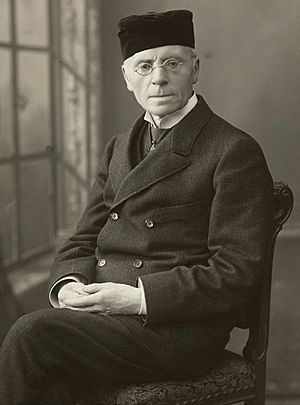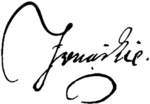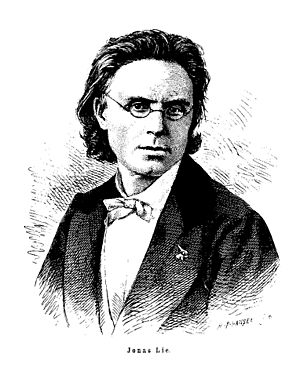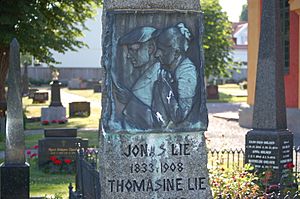Jonas Lie (writer) facts for kids
Quick facts for kids
Jonas Lie
|
|
|---|---|

Jonas Lie in 1904.
|
|
| Born | Jonas Lauritz Idemil Lie 6 November 1833 Hokksund, Eiker, Norway |
| Died | 5 July 1908 (aged 74) Stavern, Larvik, Norway |
| Occupation | Novelist, poet, fairy tales writer, journalist, and lawyer |
| Nationality | Norwegian |
| Alma mater | University of Christiania |
| Literary movement | Realism |
| Spouse | Thomasine Henriette Lie (1833–1907) |
| Signature | |
 |
|
Jonas Lauritz Idemil Lie (born November 6, 1833 – died July 5, 1908) was a famous Norwegian writer. He wrote novels, poems, and plays. Many people think he was one of "the Four Greats" of Norwegian literature in the 1800s. He was famous alongside other writers like Henrik Ibsen and Bjørnstjerne Bjørnson.
Contents
Early Life and Education
Jonas Lie was born in Hokksund, Norway. His father was Mons Lie and his mother was Pauline Christine Tiller. When Jonas was five years old, his family moved. His father became a sheriff in Tromsø. This city is located far north, inside the Arctic Circle. Jonas spent six important years of his childhood there. The wild nature and sea of the north greatly influenced his later stories.
He first went to a naval school. However, his eyesight was not good enough for a life at sea. So, he changed schools and went to Bergen Cathedral School in Bergen. In 1851, he started studying at the University of Christiania. There, he met other future famous writers, Henrik Ibsen and Bjørnstjerne Bjørnson. Jonas Lie finished his law degree in 1857. After that, he started working as a lawyer in Kongsvinger.
Writing Career
Being a lawyer in Kongsvinger was not very busy. This gave Jonas Lie time to write for newspapers. He became a regular writer for journals in Christiania. His first book was a collection of poems in 1866, but it was not very successful. For the next four years, he focused mostly on journalism. This helped him become a skilled writer.
In 1870, he published Den Fremsynte. This was a powerful story about the sea and old superstitions from Northern Norway. The next year, he traveled back to Nordland and visited Finnmark.
From 1874, the Norwegian Parliament gave him a special grant. This was like a small salary for artists. With this support, he decided to travel. He wanted to see places very different from his childhood home. He went to Rome, then lived in North Germany and Bavaria. He spent his winters in Paris. In 1882, he visited Norway for a short time. But he soon returned to Europe. He lived outside Norway until 1893. Then, he settled back in Norway, near Kristiansand. He wrote many books after returning home.
Famous Works
Jonas Lie's stories often showed the nature and folk life of Norway. He also wrote about the social life and spirit of the country. His books often focused on family life in different settings. He also wrote about the challenges women faced in educated families. Lie was a very flexible writer. He was modern and open-minded, but he also respected old traditions.
One of his best books is Familien paa Gilje (1883). This book gives a clear picture of an officer's family life. It also shows the limited choices available to the daughters in such families.
His two collections of short stories called Trold are about the superstitions of fishermen and people living along the coast in northern Norway. One famous short story, Elias and the Draugh, was included in a collection. Later, the famous writer Roald Dahl put it in his book, Roald Dahl's Book of Ghost Stories (1983).
Personal Life
In 1860, Jonas Lie married his cousin, Thomasine Henriette Lie. They had five children together, but two of them died young. Their children included Michael Strøm Lie, who became a diplomat. Two of their other children, Mons Lie and Erik Røring Møinichen Lie, also became writers. Jonas Lie passed away in 1908, less than a year after his wife Thomasine died.
In 1904, the King of Norway gave Lie a high honor. He received the Grand Cross of the Order of St. Olav. Jonas Lie was also the uncle of another writer, Bernt Lie. His wife, Thomasine, was the aunt of Jonas Lie, a Norwegian-born American painter.
Works Translated into English
Many of Jonas Lie's books have been translated into English. Here are some of them:
- Little Grey (1873)
- The Pilot and His Wife (1876)
- The Barque Future (1879)
- The Commodore's Daughter (1892)
- Weird Tales from Northern Seas (1893)
- The Visionary (1894)
- One of Life's Slaves (1895)
- Niobe (1897)
- Selected Stories and Poems (1914)
- The Family at Gilje (1920)
- The Seer & Other Norwegian Stories (1990)
See also
 In Spanish: Jonas Lie para niños
In Spanish: Jonas Lie para niños



